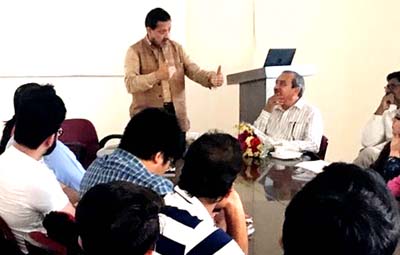Excelsior Correspondent
JAMMU, Apr 7: Noted management and media professional Ashok Ogra today said that the new media platforms have democratized communication thus ushering in ‘Information Democracy’ that is collaborative process, as opposed to 20th century ‘Information Age’ that was essentially non-participatory.
“Technology is shifting the power away from the editors, the publishers, the establishment, and the media elite. Now it is the people who are in control,” he said while interacting with the students and faculty of Department of Mass Communication & New Media, Central University Jammu, here today.
“What we are witnessing is the death of audience, an audience that was passive receivers of information till recently, being replaced with participants who want to contribute content and be counted and respected. Sharing content is the new mantra. If more people share content many more will get to see/read it, and possibly offer comment(s), thus contributing to more content being generated. In that sense content is now dynamic,” he added.
Ashok Ogra who is credited with launching Discovery Channel and Animal Planet in South Asia in 1995, where he worked as Vice President, is currently Director of Apeejay Institute of Mass Communication, Delhi and has been a Jury member of several film festivals. He is also on the Executive Council of CUJ.
“We must give credit to Mark Zuckerberg, the founder of Facebook (1994), that made communication a ‘social’ phenomenon, without the mediation of a large network/ broadcaster,” Ogra remarked and added that finally when Steve Jobs unveiled Smartphone in 2007, it totally changed the way we consume and create content: AnyWhere,
“In the past the key agents of the change were preachers, warriors, adventurers and traders, and today it is technological gadgets. But it is the speed of change that is simply mind boggling. It took Radio 45 years and TV 13 years to reach 50 million listeners/ viewers. FB hit 200 million in less than a year, and iPhone hit 1 billion apps in 9 months,” he explained.
Referring to the future of newspaper industry, Ogra said that we are going to see the traditional media platforms like newspapers focus more on filtering news to ensure accuracy and providing perspectives something that new media is not good at. “Speed is the strength of Social Media, and that can sometimes be dangerous,” he said and concluded with the observation that newspapers would adapt and evolve and, therefore survive.


